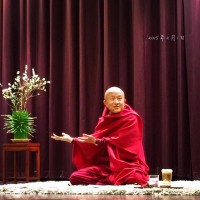The most crucial prerequisite for the practise of dharma is complete isolation because when we are alone, we are subject to fewer distractions, creating the perfect conditions for sadness to grow in our minds.
For those who know how to use it, sadness is a fertile ground from which all kinds of beneficial thoughts can spring with very little effort.
Jigme Lingpa described sadness as one of the most invaluable kinds of noble wealth, and in the sutras Buddha hailed sadness as the trailblazer for all subsequent good qualities.
With sadness comes trust and devotion, which, once developed, mean the practises of shamatha and vipashyana require very little effort. Shamatha practise ensures that mind becomes malleable and workable, and a flexible mind makes vipashyana relatively easy to accomplish.

Dzongsar Khyentse Rinpoche
from the book Not for Happiness: A Guide to the So-Called Preliminary Practices
Read a random quote or see all quotes by Dzongsar Khyentse Rinpoche.
Further quotes from the book Not for Happiness:
- Not designed to cheer you up
- Sign of a mature practitioner
- No end to samsara’s sufferings
- Intention to benefit all sentient beings
- Wishing happiness for those who have hurt you
- Filtered perception
- Being able to start practicing right away
- Sources of our inspiration
- Rip that ego apart
- Relative and absolute truth
- It’s all a matter of motivation
- The decision to follow a spiritual path
- Three higher trainings
- Opposite direction to dharma
- No substitute for being guided by a guru
- Maintaining a strong grip on the habits
- Merely the product of your own perception
- Dharma is not a therapy
- Our fundamental problem